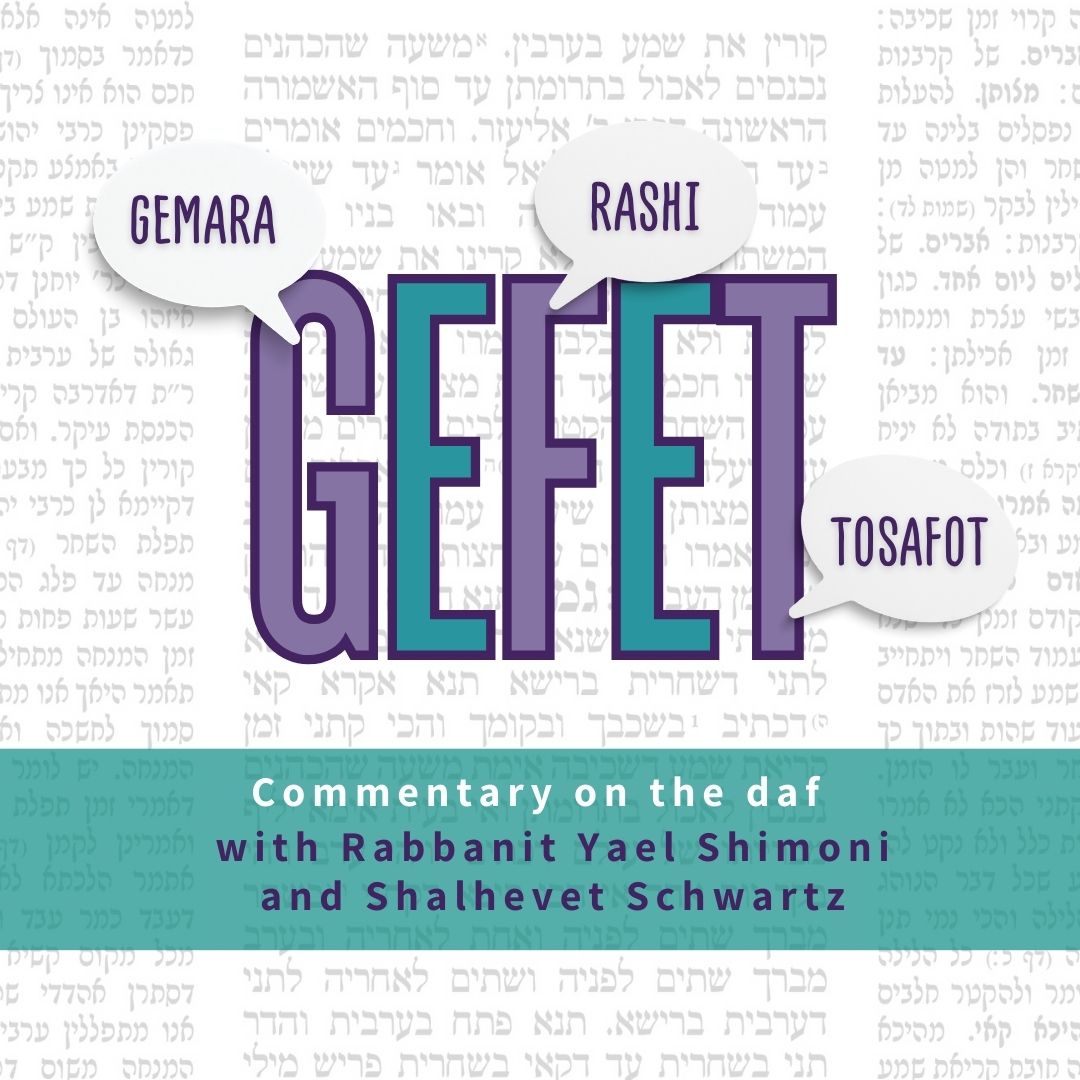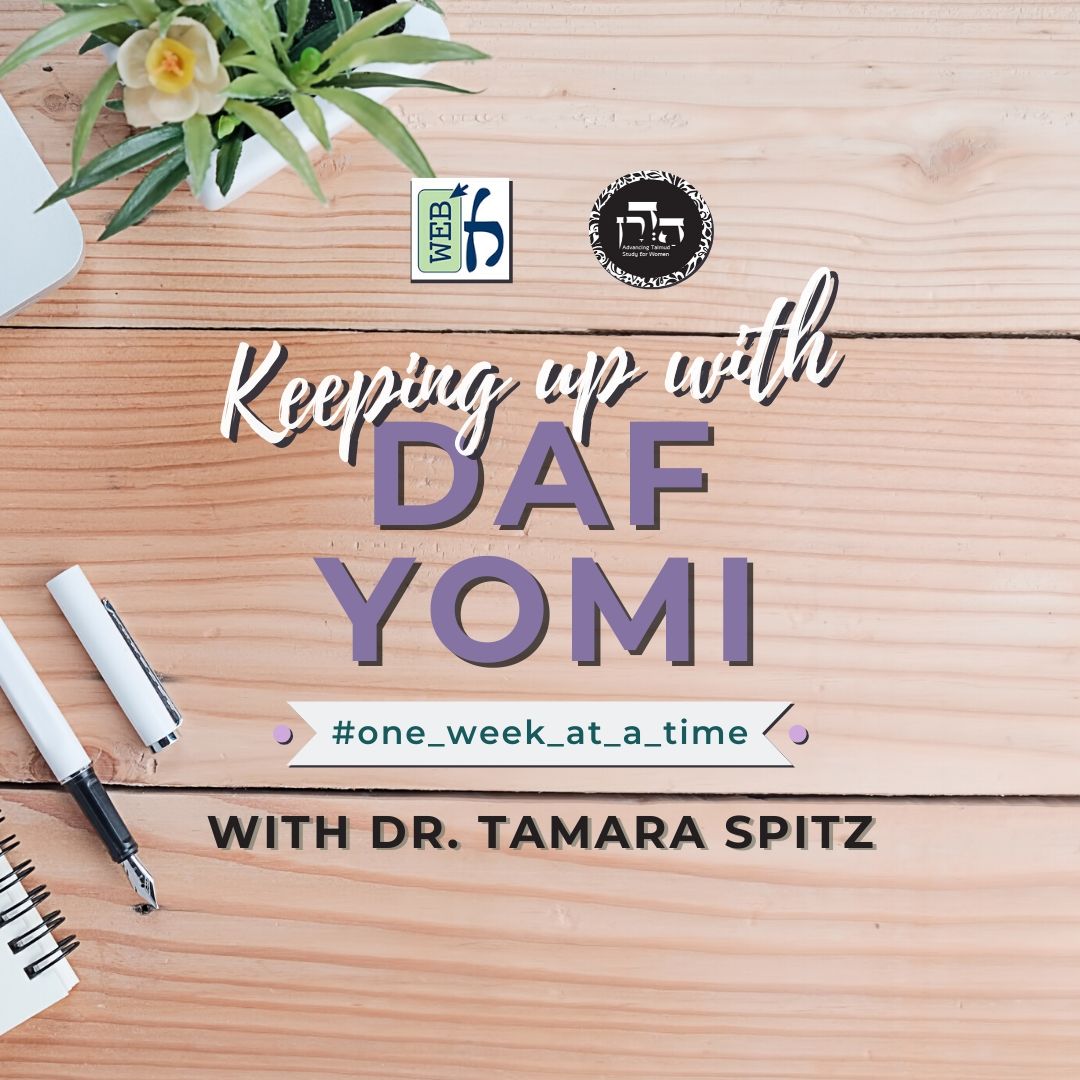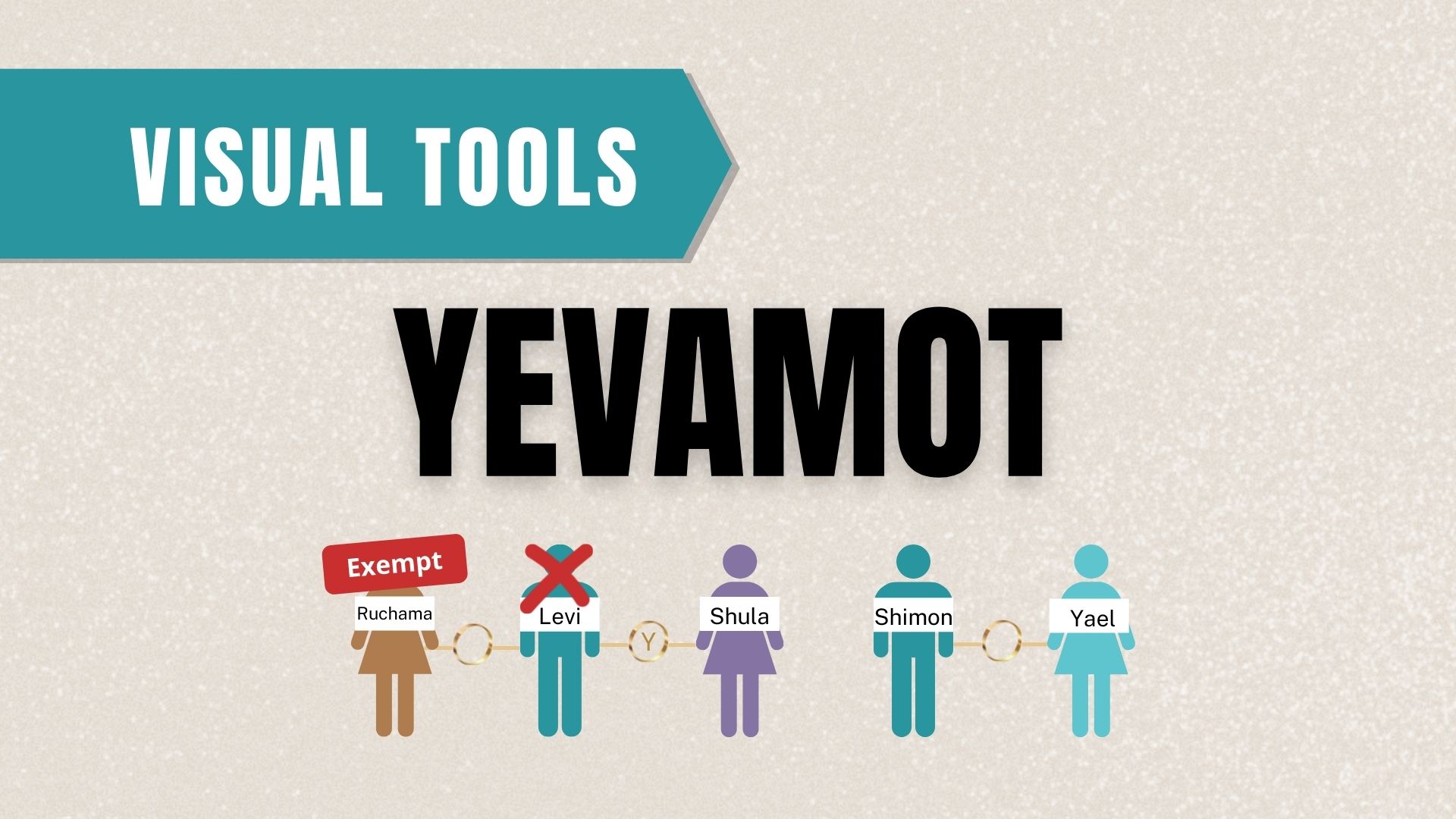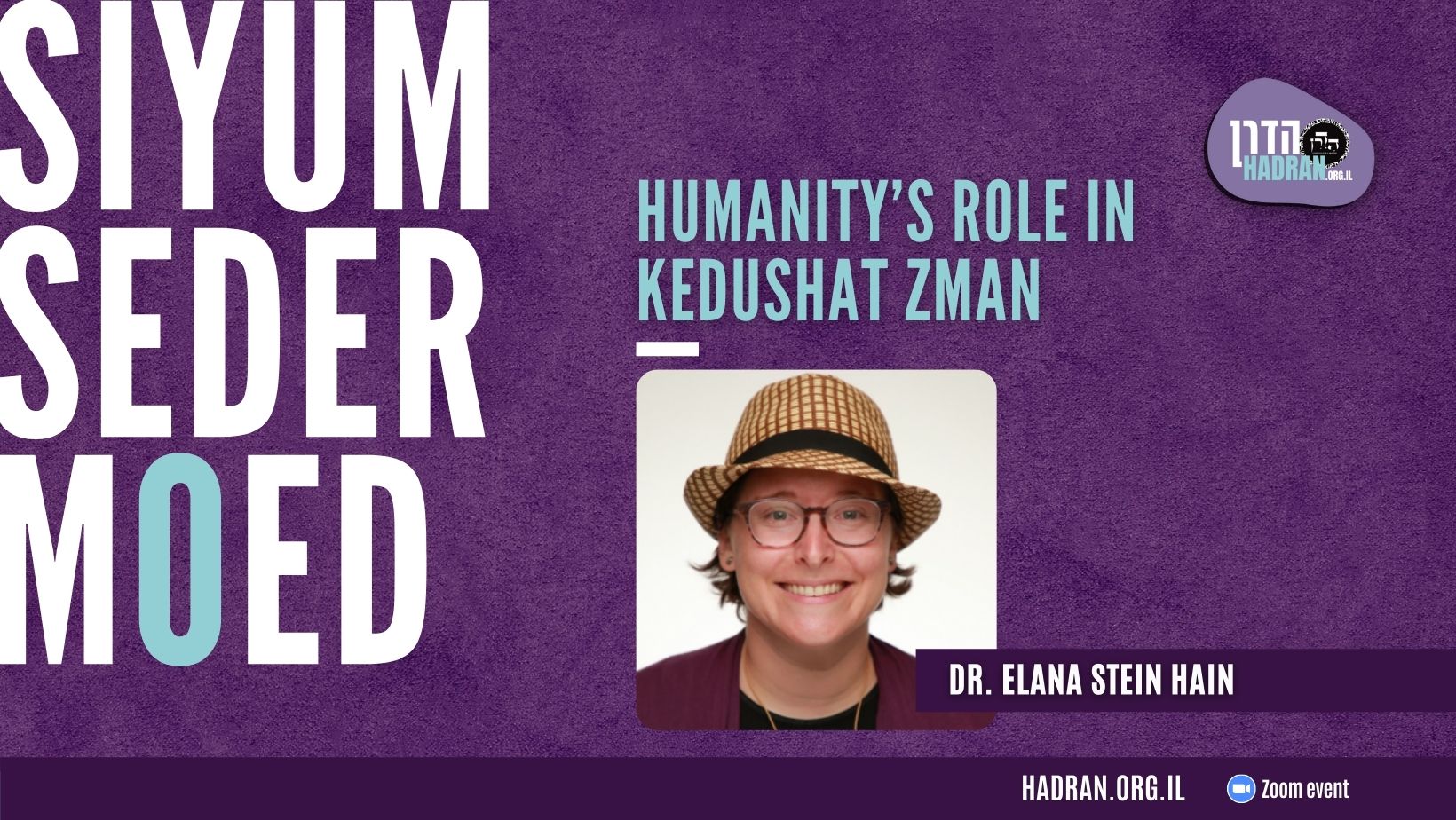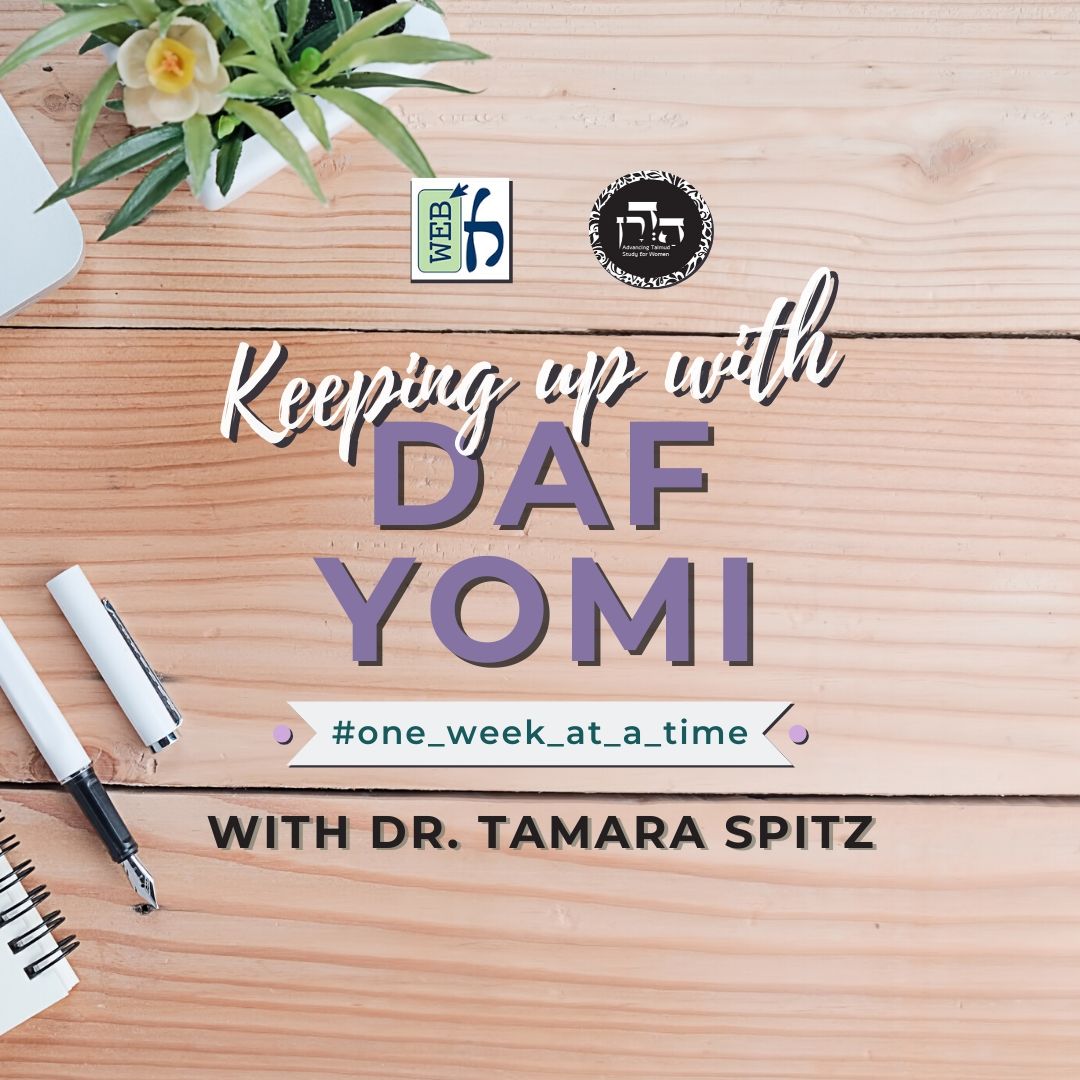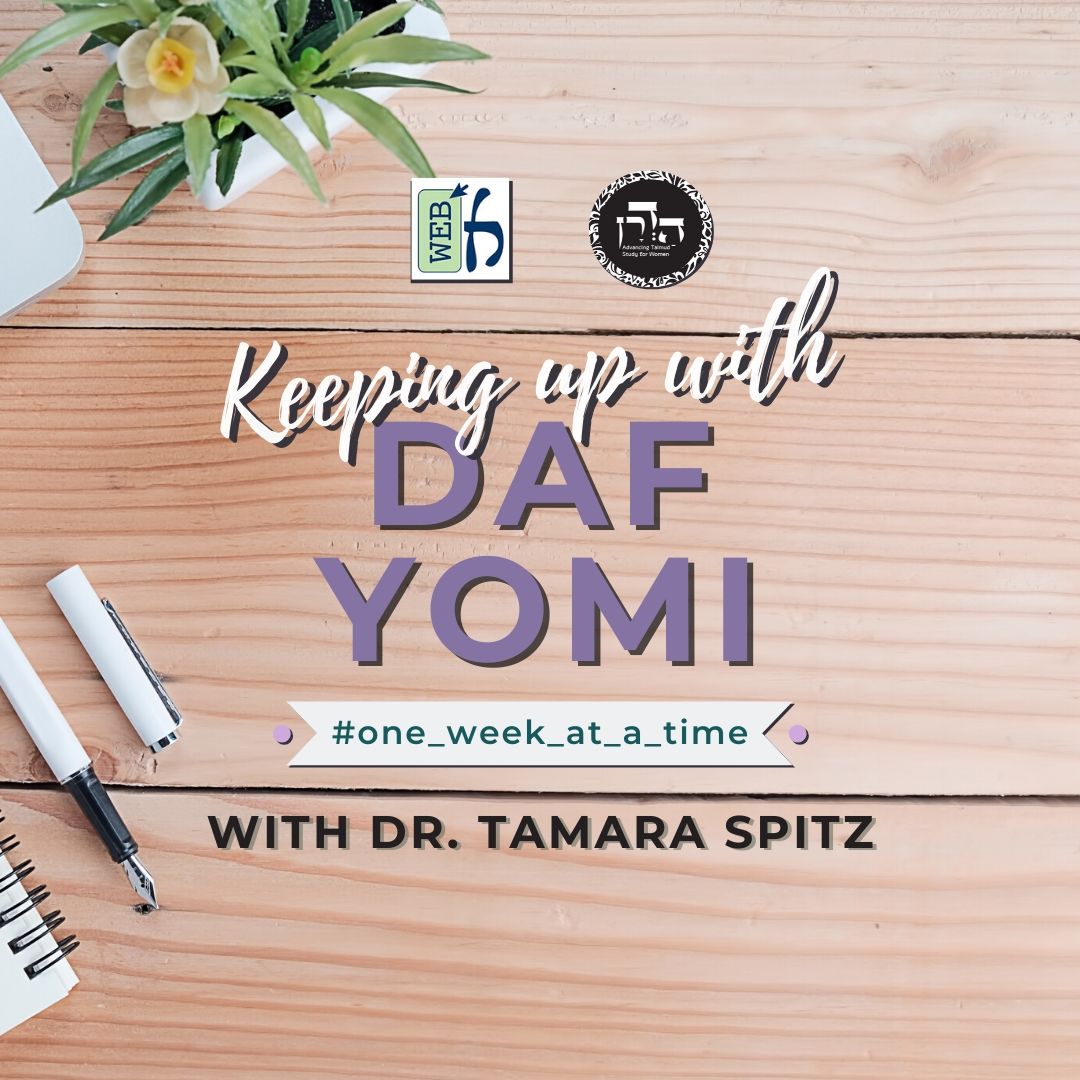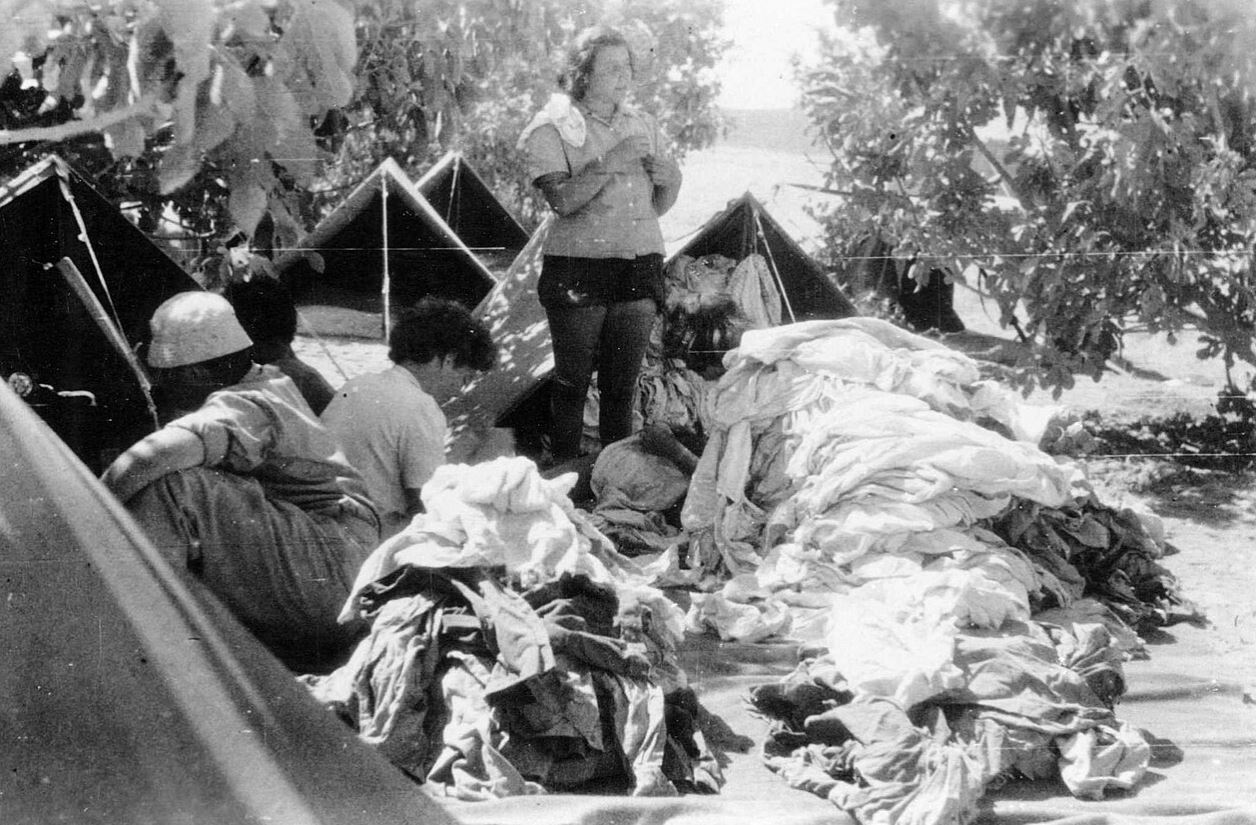One who miscarries on the 81st day after childbirth, is she obligated to bring two sacrifices or just one? Since one can’t sacrifice at night, is it as if she is not yet obligated to bring the first sacrifice and therefore she only brings one, or is it considered already day 81, just she can’t bring the sacrifice for technical reasons, and therefore she’d bring two sacrifices? If a woman is obligated in 5 zava sacrifices or 5 birth sacrifices or 5 sacrifices that there is uncertainty about whether or not she is obligated to bring them – does bringing one allow her to eat sacrificial meat? Is she obligated to bring all of them? What if she has certaincy about some and uncertaincy about others? Who is included in the list of those who need to bring a sacrifice to finish the atonement process?
This month’s learning is dedicated to the refuah shleima of our dear friend, Phyllis Hecht, גיטל פעשא בת מאשה רחל by all her many friends who love and admire her. Phyllis’ emuna, strength, and positivity are an inspiration.
Want to dedicate learning? Get started here:


Today’s daily daf tools:
This month’s learning is dedicated to the refuah shleima of our dear friend, Phyllis Hecht, גיטל פעשא בת מאשה רחל by all her many friends who love and admire her. Phyllis’ emuna, strength, and positivity are an inspiration.
Today’s daily daf tools:
Delve Deeper
Broaden your understanding of the topics on this daf with classes and podcasts from top women Talmud scholars.
New to Talmud?
Check out our resources designed to help you navigate a page of Talmud – and study at the pace, level and style that fits you.
The Hadran Women’s Tapestry
Meet the diverse women learning Gemara at Hadran and hear their stories.
Keritot 8
גְּמָ׳ תַּנְיָא: אָמְרוּ לָהֶן בֵּית הִלֵּל לְבֵית שַׁמַּאי: הֲרֵי הוּא אוֹמֵר: ״לְבַת״ לְרַבּוֹת אוֹר שְׁמוֹנִים וְאֶחָד.
GEMARA: In continuation of the discussion of the mishna, it is taught in a baraita that Beit Hillel said to Beit Shammai: The verse states: “And when the days of her purification are fulfilled, for a son or for a daughter” (Leviticus 12:6). The entire clause: “For a son or for a daughter,” is superfluous and serves to include the night preceding the eighty-first day, i.e., if she has a miscarriage at that point she is obligated to bring another offering.
רַבִּי הוֹשַׁעְיָא הֲוָה שְׁכִיחַ קַמֵּיהּ דְּבַר קַפָּרָא, שַׁבְקֵיהּ וַאֲתָא קַמֵּיהּ דְּרַבִּי חִיָּיא. יוֹמָא חַד פְּגַע בֵּיהּ, בְּעָא מִינֵּיהּ: זָב שֶׁרָאָה שָׁלֹשׁ רְאִיּוֹת בְּלֵיל שְׁמִינִי, מָה בֵּית הִלֵּל אוֹמְרִים בְּדָבָר זֶה?
The Gemara relates: Rabbi Hoshaya would regularly study before bar Kappara. He then left him and came to study before Rabbi Ḥiyya. One day Rabbi Hoshaya encountered bar Kappara and raised the following dilemma before him: With regard to a man who experiences a gonorrhea-like discharge [zav], who is obligated to bring an offering on the eighth day of his purification for three discharges, if he saw another three sightings, i.e., experienced an additional three discharges, on the night preceding the eighth day, what do Beit Hillel say about this matter? Must the zav bring a separate offering for this impurity as he would if he experienced the discharges on the eighth day?
טַעְמַיְיהוּ דְּבֵית הִלֵּל בְּמַפֶּלֶת בַּלַּיְלָה מִשּׁוּם דִּכְתִיב: ״לְבַת״, אֲבָל זָב שֶׁרָאָה שָׁלֹשׁ רְאִיּוֹת בְּלֵיל שְׁמִינִי – פָּטְרִי, דְּלָא מְיַיתְּרִי קְרָאֵי, אוֹ דִלְמָא לָא שְׁנָא?
Rabbi Hoshaya explains the sides of the dilemma: Is the reason for the ruling of Beit Hillel that a woman who miscarries on the night preceding the eighty-first day must bring an additional offering due to the derivation from the verse, as it is written: “For a son or for a daughter”? But with regard to a zav who saw three sightings on the night preceding the eighth day, they deem him exempt, as in this case there are no superfluous verses from which one could derive this obligation. Or perhaps there is no difference between these halakhot, and just as a woman who miscarried on the night preceding the eighty-first day after childbirth must bring another offering, as it is the night preceding the day upon which she can bring her offering, a zav must likewise bring another offering for this impurity.
אֲמַר לֵיהּ בַּר קַפָּרָא: מָה בָּבְלִי אוֹמֵר בְּדָבָר זֶה? אִישְׁתִּיק רַבִּי הוֹשַׁעְיָא, לָא אֲמַר כְּלוּם. אֲמַר לֵיהּ בַּר קַפָּרָא: צְרִיכִין לְדִבְרֵי עִיָּיא? נַחְזוֹר עַל הָרִאשׁוֹנוֹת: הֲרֵי הוּא אוֹמֵר: ״לְבַת״ – לְרַבּוֹת אוֹר שְׁמוֹנִים וְאֶחָד.
Bar Kappara said to Rabbi Hoshaya: What does the Babylonian, i.e., Rabbi Ḥiyya, who came from Babylonia, say about this matter? Rabbi Hoshaya was silent and did not say anything. Bar Kappara said to him: Do we require the statement of Iyya, i.e., Ḥiyya? Let us review the earlier ruling, as the baraita teaches that the verse that states: “For a son or for a daughter” (Leviticus 12:6), serves to include the night of the eighty-first day. This indicates that the halakha applies only in the case of a woman after childbirth.
נֵימָא כְּתַנָּאֵי: זָב שֶׁרָאָה שָׁלֹשׁ רְאִיּוֹת בְּלֵיל שְׁמִינִי, תָּנֵי חֲדָא: מֵבִיא, וְתַנְיָא אִידַּךְ: אֵינוֹ מֵבִיא. מַאי לַָאו תַּנָּאֵי הִיא, דְּהָא דְּתַנְיָא מֵבִיא, קָסָבַר: לַיְלָה אֵין מְחוּסַּר זְמַן, וְהָדְתָנֵי אֵין מֵבִיא, קָסָבַר: לַיְלָה מְחוּסַּר זְמַן?
The Gemara suggests: Let us say this dilemma is subject to a dispute between tanna’im. With regard to a zav who saw three sightings on the night preceding the eighth day, it is taught in one baraita that he brings an additional offering, and it is taught in another baraita that he does not bring another offering. What, is it not the case that this is a dispute between tanna’im? As, the tanna of this baraita who taught that he brings an additional offering holds that night is not considered part of a date whose time has not yet arrived, and therefore it is as though the eighth day itself has begun; and the tanna of that baraita who taught that he does not bring another offering holds that night is considered part of a date whose time has not yet arrived, and consequently it is not yet time to sacrifice his first offering of a zav.
אָמַר רַב הוּנָא בַּר אַחָא אָמַר רַבִּי אֶלְעָזָר: הָנֵי תַּנָּאֵי סָבְרִי לַיְלָה מְחוּסַּר זְמַן. וְהָא דְּתַנְיָא מֵבִיא – בְּזָב בַּעַל שְׁתֵּי רְאִיּוֹת, וְהָדְתַנְיָא אֵין מֵבִיא – בְּזָב בַּעַל שָׁלֹשׁ רְאִיּוֹת.
Rav Huna bar Aḥa said that Rabbi Elazar said: These tanna’im both hold that night is considered part of a date whose time has not yet arrived, and therefore a zav who experienced three discharges on the night preceding the eighth day does not bring another offering. And the ruling of this baraita, which taught that he brings an additional offering, is stated with regard to a zav who experienced two sightings. Since this zav has completed his purification process, as he is not obligated to bring an offering, these discharges constitute a new instance of ritual impurity. And the ruling of that baraita, which taught that he does not bring another offering, is stated with regard to a zav who had experienced three sightings. This zav must bring an offering, and the time for the offering has not yet arrived on the eighth night. Therefore, he is not obligated to bring another offering.
זָב בַּעַל שְׁתֵּי רְאִיּוֹת, מַאי לְמֵימְרָא? הָא קָא מַשְׁמַע לַן: דַּוְקָא רָאָה בְּלֵיל שְׁמִינִי, אֲבָל בִּימָמָא דִּשְׁבִיעִי, לָא. קָסָבַר: כׇּל רְאִיָּיה שֶׁסּוֹתֶרֶת – אֵין מְבִיאָה לִידֵי קׇרְבָּן.
The Gemara raises a difficulty: If the ruling of that baraita is stated with regard to a zav who experienced two sightings, what is the purpose of stating this halakha? It is obvious that this is a new instance of ritual impurity. The Gemara explains: This is what the baraita teaches us: It is specifically if this zav saw a discharge on the night preceding the eighth day that he must bring an offering; but if he saw a discharge on the seventh day he is not obligated to bring an offering. This is because the tanna of this baraita holds: Any sighting of ziva that negates the days of purity, i.e., which causes the zav to have to count seven clean days afresh, does not bring him to the point of being liable to bring another offering.
אָמַר רָבָא: אַמַּאי אוֹקֵימְתַּאּ לְהָא דְּתַנְיָא אֵין מֵבִיא – בְּזָב בַּעַל שָׁלֹשׁ רְאִיּוֹת, לִיתְנְיַיהּ גַּבֵּי, חֲמִשָּׁה מְבִיאִין קׇרְבָּן אֶחָד עַל עֲבֵירוֹת הַרְבֵּה! – לָא פְּסִיקָא, דְּאָמַר רַבִּי יוֹחָנָן: רָאָה אַחַת בַּלַּיְלָה וּשְׁתַּיִם בַּיּוֹם – מֵבִיא, שְׁתַּיִם בַּלַּיְלָה וְאַחַת בַּיּוֹם – אֵין מֵבִיא.
Rava said: Why did you interpret that which is taught in the baraita, i.e., that he does not bring another offering, as stating a ruling with regard to a zav who experienced three sightings? If that is correct, let the tanna teach this example in the list that appears in a mishna from the next chapter (9a): There are five people who bring one offering for multiple transgressions, i.e., for violating the same transgression several times. The Gemara explains: The tanna did not include this case in that list because he could not state this halakha as a definitive ruling. As Rabbi Yoḥanan says: If the zav saw one discharge at night and then two on the eighth day, he brings an additional offering for these discharges. By contrast, if he saw two discharges at night and one in the day, he does not bring an additional offering.
אָמַר רַב יוֹסֵף: תֵּדַע דְּאַחַת בַּלַּיְלָה וּשְׁתַּיִם בַּיּוֹם מֵבִיא, דְּהָא רְאִיָּיה רִאשׁוֹנָה שִׁכְבַת זֶרַע בְּעָלְמָא, וְאִילּוּ חָזֵי תַּרְתֵּין אַחְרָנְיָיתָא מִצְטָרְפִי לְהוּ.
Rav Yosef said: Know that if a zav saw one discharge at night and two in the day he brings an additional offering. This is because the first sighting of any zav is considered merely semen, since one who has a single discharge of ziva immerses on that day and is rendered ritually pure at sundown, like one who experiences a seminal emission. And yet if he sees two other discharges they combine with the first one to establish him as a zav and render him liable to bring an offering. The same applies in this case with regard to the eighth day.
אָמַר רַב שֵׁשֶׁת בְּרֵיהּ דְּרַב אִידִי: מִידֵּי אִירְיָא? רְאִיָּיה רִאשׁוֹנָה שֶׁל זָב – חַזְיַיהּ בִּזְמַן חִיּוּבָא. אַחַת בַּלַּיְלָה, כֵּיוָן דְּלָאו בִּזְמַן חִיּוּבָא חַזְיַיהּ, אִי לָאו דְּאַשְׁמְעִינַן רַבִּי יוֹחָנָן דְּמִצְטַרְפָא, הֲוָה אָמֵינָא לָא תִּצְטְרֵף.
Rav Sheshet, son of Rav Idi, said: Are the cases comparable? With regard to the first sighting of a zav, he saw it at a time of potential liability to bring an offering, which is why it combines with the next two discharges. By contrast, in a case where a zav sees one discharge at night preceding the eighth day, since he saw it when it was not the time of potential liability to bring an offering for the subsequent two sightings, as one who sees three discharges on the night preceding the eighth day does not bring an additional offering, were it not for the fact that Rabbi Yoḥanan teaches us that it combines with the other two discharges I would say it does not combine with them.
וּמִי אָמַר רַבִּי יוֹחָנָן: לַיְלָה מְחוּסַּר זְמַן?
The Gemara asks: And does Rabbi Yoḥanan actually say that night is considered part of a date whose time has not yet arrived, as indicated by his ruling that if a zav experienced two discharges at night and one in the daytime he does not bring an additional offering?
וְהָאָמַר חִזְקִיָּה: נִטְמָא בַּיּוֹם – מֵבִיא, בַּלַּיְלָה – אֵין מֵבִיא. וְרַבִּי יוֹחָנָן אָמַר: אֲפִילּוּ בַּלַּיְלָה – מֵבִיא!
But doesn’t Ḥizkiyya say that if a nazirite contracted ritual impurity through contact with a corpse and underwent the purification rites, after which he must bring an offering on the eighth day, and he again became ritually impure on the eighth day itself, he brings a second set of offerings. But if he became ritually impure on the night preceding the eighth day he does not bring an additional set of offerings, because he could not have brought the offering at night. And Rabbi Yoḥanan says: Even if the nazirite became ritually impure on the night preceding the eighth day, he brings a second set of offerings. This indicates that according to Rabbi Yoḥanan, night is not considered part of a date whose time has not yet arrived.
כִּי קָאָמַר רַבִּי יוֹחָנָן: ״שְׁתַּיִם בַּלַּיְלָה וְאַחַת בַּיּוֹם – אֵין מֵבִיא״, לְדִבְרֵי הָאוֹמֵר מְחוּסַּר זְמַן.
The Gemara answers: When Rabbi Yoḥanan says that if a zav experienced two discharges at night and one on the eighth day he does not bring an additional offering, he spoke according to the statement of the one who says that night is considered part of a date whose time has not yet arrived. He himself maintains that even if a zav experienced all three discharges at night he must bring an additional offering.
לְדִבְרֵי הָאוֹמֵר? פְּשִׁיטָא! רָאָה אַחַת בַּלַּיְלָה וּשְׁתַּיִם בַּיּוֹם אִיצְטְרִיכָא לֵיהּ. מַהוּ דְּתֵימָא: כֵּיוָן דְּלָאו בִּזְמַן חִיּוּבָא קָחָזֵי לֵיהּ – לָא תִּצְטְרֵף, קָא מַשְׁמַע לַן.
The Gemara objects: If he spoke only according to the statement of the one who says that night is considered part of a date whose time has not yet arrived, it is obvious that no new offerings are required. What novelty did Rabbi Yoḥanan intend to express? The Gemara answers: It was necessary for him to teach the first case, of a zav who saw one discharge at night and two in the day. Lest you say: Since he saw the one at night when it was not the time of incurring liability to bring an offering, it should not combine with the other two discharges. Rabbi Yoḥanan therefore teaches us that the discharges do combine with each other.
מַתְנִי׳ הָאִשָּׁה שֶׁיֵּשׁ עָלֶיהָ סְפֵק חָמֵשׁ לֵידוֹת וּסְפֵק חָמֵשׁ זִיבוֹת – מְבִיאָה קׇרְבָּן אֶחָד וְאוֹכֶלֶת בִּזְבָחִים וְאֵין הַשְּׁאָר עָלֶיהָ חוֹבָה. חָמֵשׁ זִיבוֹת וַדָּאוֹת וְחָמֵשׁ לֵידוֹת וַדָּאוֹת – מְבִיאָה קׇרְבָּן אֶחָד וְאוֹכֶלֶת בִּזְבָחִים וְהַשְּׁאָר עָלֶיהָ חוֹבָה.
MISHNA: With regard to a woman who has in her case uncertainty concerning five births, and likewise a woman with regard to whom there is uncertainty concerning five irregular discharges of blood from the uterus [ziva], she brings one offering, and then she may partake of the meat of offerings. And the remaining offerings are not an obligation for her. If she experienced five definite discharges of a zava or five definite births, she brings one offering, and then she may partake of the meat of offerings. And the remaining offerings are an obligation for her.
מַעֲשֶׂה שֶׁעָמְדוּ קִינִּין בִּירוּשָׁלַיִם בְּדִינַר זָהָב, אָמַר רַבָּן שִׁמְעוֹן בֶּן גַּמְלִיאֵל: הַמָּעוֹן הַזֶּה, לֹא אָלִין הַלַּיְלָה עַד שֶׁיִּהְיֶה בְּדִינָרִין (בַּסּוֹף) [כֶּסֶף!] נִכְנַס לְבֵית דִּין וְלִמֵּד: ״הָאִשָּׁה שֶׁיֵּשׁ עָלֶיהָ חָמֵשׁ לֵידוֹת וַדָּאוֹת חָמֵשׁ זִיבוֹת וַדָּאוֹת – מְבִיאָה קׇרְבָּן אֶחָד וְאוֹכֶלֶת בִּזְבָחִים וְאֵין הַשְּׁאָר עָלֶיהָ חוֹבָה״ וְעָמְדוּ קִינִּין בַּיּוֹם הַהוּא בְּרִבְעָתַיִם.
There was an incident where the price of nests, i.e., pairs of birds, stood in Jerusalem at one gold dinar, as the great demand for birds for the offerings of a woman after childbirth and a zava led to an increase in the price. Rabban Shimon ben Gamliel said: I swear by this abode of the Divine Presence that I will not lie down tonight until the price of nests will be in silver dinars. Ultimately, he entered the court and taught: A woman who has in her case five definite discharges of a zava or five definite births brings one offering, and then she may partake of the meat of offerings. And the remaining offerings are not an obligation for her. And as a result, the price of the nests stood that day at one-quarter of a silver dinar, as the demand for nests decreased.
גְּמָ׳ תָּנוּ רַבָּנַן: חָמֵשׁ לֵידוֹת וַדַּאי חָמֵשׁ זִיבוֹת סָפֵק אוֹ חָמֵשׁ לֵידוֹת וַדַּאי וְחָמֵשׁ לֵידוֹת סָפֵק – מְבִיאָה שְׁתֵּי קִינִּין, אַחַת עַל הַוַּדַּאי וְאַחַת עַל הַסָּפֵק, שֶׁל וַדַּאי נֶאֱכֶלֶת וְהַשְּׁאָר עָלֶיהָ חוֹבָה, שֶׁל סָפֵק אֵין נֶאֱכֶלֶת וְאֵין הַשְּׁאָר עָלֶיהָ חוֹבָה.
GEMARA: The Sages taught in a baraita (Tosefta 1:10): If a woman has the obligations of five definite births and five uncertain discharges of a zava, or five definite births and five uncertain births, she brings two nests, one for the definite obligation and one for the uncertain obligation. That which she brought for the definite obligation is eaten by the priests, and the remaining offerings are an obligation for her. That which she brought for the uncertain obligation is not eaten, and the remaining offerings are not an obligation for her.
רַבִּי יוֹחָנָן בֶּן נוּרִי אוֹמֵר: עַל וַדַּאי תֹּאמַר: ״עַל הָאַחֲרוֹנָה״ וְתִפָּטֵר. שֶׁל סָפֵק, אִם יֵשׁ וַדַּאי בֵּינֵיהֶן, תֹּאמַר: ״עַל הַוַּדַּאי״ וְתִפָּטֵר, וְאִם לָאו, תֹּאמַר: ״עַל אֶחָד מֵהֶן״ וְתִפָּטֵר. רַבִּי עֲקִיבָא אוֹמֵר: בֵּין עַל הַוַּדַּאי בֵּין עַל הַסָּפֵק, תֹּאמַר: ״עַל אַחַת מֵהֶן״ וְתִפָּטֵר.
Rabbi Yoḥanan ben Nuri says: With regard to offerings brought for the definite obligation, she should say: I am bringing the offering for the last definite obligation, and she is exempt from bringing the rest of the offerings. The reason is so that she should not think that no atonement is required for the others. With regard to offerings brought for the uncertain obligation, if there is a definite obligation among the uncertain offerings she should say: I am bringing it for the definite obligation, and she is exempt from the rest. But if there is no definite obligation she should say: I am bringing the offering for any one of them, not necessarily for the last one, and she is exempt. Rabbi Akiva says: Whether she brings her offering for the definite obligation or whether she brings it for the uncertain obligation, she should say: I am bringing it for one of them, and she is exempt.
אֲמַר לֵיהּ רַב נַחְמָן בַּר יִצְחָק לְרַב פָּפָּא, אֵימָא לָךְ מִשְּׁמֵיהּ דְּרָבָא: הָנֵי תַּנָּאֵי בְּמַאי פְּלִיגִי, דְּרַבִּי יוֹחָנָן בֶּן נוּרִי מְדַמֵּי לְהוֹן לְחַטָּאת, דְּמַאן דְּחַיָּיב חָמֵשׁ חַטָּאוֹת עַד דְּמַיְיתֵי כּוּלְּהוֹן וְסוֹף מִכַּפַּר לֵיהּ, הָכָא נָמֵי לָא שְׁנָא.
Rav Naḥman bar Yitzḥak said to Rav Pappa: I will say a statement to you in the name of Rava: With regard to these tanna’im, with regard to what matter do they disagree? Their disagreement is that Rabbi Yoḥanan ben Nuri, who requires her to bring the offering for her definite obligation for the last definite obligation, compares the offerings of a woman after childbirth to a sin offering brought for a transgression. As, one who is liable to bring five sin offerings does not achieve atonement until he brings all of them, and only the offering that he brings at the end atones for him. Here too, it is no different, and therefore she achieves atonement and may consume sacrificial food only if she brings an offering for her last obligation.
וְרַבִּי עֲקִיבָא מְדַמֵּי לְהוֹן לִטְבִילוֹת, דְּמַאן דִּמְחַיַּיב חָמֵשׁ טְבִילוֹת, כֵּיוָן דְּטָבֵיל חֲדָא זִימְנָא אִיטְּהַר, הָכָא נָמֵי לָא שְׁנָא.
And Rabbi Akiva compares the offerings of a woman after childbirth to immersions in a ritual bath. As with regard to one who is obligated to perform five immersions, once he has immersed one time he is purified. Here too, it is no different, and consequently as soon as she brings an offering for any of the obligations she is ritually pure and is permitted to partake of sacrificial food.
אֲמַר לֵיהּ רַב פָּפָּא: אִי סָלְקָא דַעְתָּךְ רַבִּי יוֹחָנָן בֶּן נוּרִי לְחַטָּאת מְדַמֵּי לְהוֹן, אַמַּאי שֶׁל סָפֵק תֹּאמַר: ״עַל אַחַת מֵהֶן״, וְתִפָּטֵר? אִילּוּ מַאן דִּמְחַיַּיב
Rav Pappa said to Rav Naḥman bar Yitzḥak: If it enters your mind that Rabbi Yoḥanan ben Nuri compares the offerings of a woman after childbirth to a sin offering, why then, with regard to offerings brought for the uncertain obligation, should she say: I am bringing it for any one of them, and she is exempt? If one who is obligated
חָמֵשׁ אֲשָׁמוֹת תְּלוּיִין, כִּי מַיְיתֵי חַד מִי מִיפְּטַר? וְהָתַנְיָא, זֶה הַכְּלָל: כֹּל שֶׁחֲלוּקִין בְּחַטָּאוֹת – חֲלוּקִין בַּאֲשָׁמוֹת!
to bring five provisional guilt offerings, when he brings one offering is he exempt from bringing the rest? But isn’t it taught in a baraita that this is the principle: In any case where one’s transgressions are divided with regard to sin offerings, i.e., where one must bring a separate sin offering for each act when he becomes aware that he has sinned, they are likewise divided with regard to provisional guilt offerings, when there is uncertainty as to whether or not he sinned?
אֶלָּא, דְּכוּלֵּי עָלְמָא לִטְבִילוֹת מְדַמֵּי לְהוֹן, וּבְחוֹשְׁשִׁין לִפְשִׁיעָה קָמִיפַּלְגִי, רַבִּי יוֹחָנָן בֶּן נוּרִי סָבַר: חָיְישִׁינַן לִפְשִׁיעָה, וְרַבִּי עֲקִיבָא סָבַר: לָא חָיְישִׁינַן לִפְשִׁיעָה.
Rather, everyone agrees that we compare the sin offerings of a woman after childbirth and a zava to immersions, and therefore by Torah law it is sufficient for her to say: I am bringing it for one of them. And they disagree with regard to whether we are concerned for her negligence. Rabbi Yoḥanan ben Nuri maintains we are concerned for her negligence. In other words, if she says: I am bringing it for one of my obligations, if she gives birth in the following years she might think that she does not need to bring an offering for each birth, and she will neglect to bring an offering. By requiring her to declare: I am bringing the offering for the last definite obligation, the Sages thereby remind her that all her births require offerings. And Rabbi Akiva maintains we are not concerned for her negligence, and therefore it is sufficient for her to say: I am bringing the offering for one of them.
הֲדַרַן עֲלָךְ שְׁלֹשִׁים וָשֵׁשׁ
מַתְנִי׳ אַרְבָּעָה מְחוּסְּרֵי כַּפָּרָה, וְאַרְבָּעָה מְבִיאִין עַל הַזָּדוֹן כַּשּׁוֹגֵג.
MISHNA: There are four individuals whose halakhic status is defined as: Lacking atonement [khappara], which means they had been in a state of ritual impurity and underwent rituals to purify themselves, but since they have not yet brought the requisite atonement offering to complete the purification process, they may not partake of sacrificial meat. And there are also four individuals who bring an offering for an intentional transgression in the same manner as they do for an unwitting transgression.
וְאֵלּוּ הֵן מְחוּסְּרֵי כַּפָּרָה: הַזָּב, וְהַזָּבָה, וְהַיּוֹלֶדֶת, וְהַמְצוֹרָע.
And these are the four individuals who lack atonement: The man who experiences a gonorrhea-like discharge [zav], the woman who experiences a discharge of uterine blood after her menstrual period [zava], the woman after childbirth, and the leper. In all four of these cases, although the individual has completed all of the other steps of the purification process, the process is not complete until the atonement offering has been brought.
רַבִּי אֱלִיעֶזֶר בֶּן יַעֲקֹב אוֹמֵר: גֵּר מְחוּסָּר כַּפָּרָה עַד שֶׁיִּזָּרֵק עָלָיו הַדָּם. נָזִיר – לְיֵינוֹ וְתִגְלַחְתּוֹ וְטוּמְאָתוֹ.
Rabbi Eliezer ben Ya’akov says: A convert also lacks atonement, even after he has been circumcised and has immersed in a ritual bath, until the priest sprinkles the blood of his offering on the altar on his behalf. A nazirite also lacks atonement with regard to his permission for drinking wine, and cutting his hair, and his exposure to ritual impurity imparted by a corpse, until his offerings are sacrificed.
גְּמָ׳ שְׁנָא זָב וְזָבָה דְּמָנֵי לְהוֹן בִּתְרֵין – מִשּׁוּם דַּחֲלוּקָהּ טוּמְאָתוֹ, דְּזָב לָא מְטַמֵּא בְּאוֹנֶס וְזָבָה לָא מְטַמְּאָה בִּרְאִיּוֹת בְיָמִים,
GEMARA: The mishna lists four individuals whose status is defined as lacking atonement until their offering is brought: The zav, the zava, the woman after childbirth, and the leper. The Gemara asks: What is different about a zav and a zava, that the tanna decided to count them as two separate cases? The Gemara answers: They are different due to the fact that the impurity of a zav is distinct from that of a zava, as a zav does not become impure if he has a discharge by accident, i.e., due to a cause such as an illness or having consumed certain foods, whereas there is no such exemption in the case of a zava; and a zava, unlike a zav, does not become impure by three sightings of menstrual-type blood on one day like she becomes impure by sightings on three consecutive days.
דתניא: ״מבשרו״ – ולא מחמת אונסו. (ומי טמא) [ומיטמא] בראיות כבימים, דתניא: תלה הכתוב את הזכר בראיות ואת הנקבה בימים. וזבה מטמאה באונס, ולא מטמאה בראיות כבימים.
As it is taught in a baraita: The verse states: “When any man has a discharge from his flesh, his discharge is impure” (Leviticus 15:2). The term “from his flesh” teaches that the discharge is impure only if it is due to an internal cause, and not due to his accident. And furthermore, a zav becomes impure by three sightings of gonorrhea-like discharge on one day like he becomes impure by three such sightings on three consecutive days, as it is taught in a baraita: The verse links the impurity of the male, i.e., a zav, to the number of sightings on the same day or on consecutive days, and of the female zava to the number of consecutive days on which she experiences sightings of blood. And by contrast, a zava becomes impure if she has a discharge by accident, and does not become impure by three sightings on one day like she becomes impure by sightings on three consecutive days. Therefore, the mishna counts them as two separate cases.
מְצוֹרָע וּמְצוֹרַעַת נָמֵי חֲלוּקָה טוּמְאָתָן, דִּמְצוֹרָע טָעוּן פְּרִיעָה וּפְרִימָה, דִּכְתִיב: ״בְּגָדָיו יִהְיוּ פְרֻמִים וְרֹאשׁוֹ יִהְיֶה פָרוּעַ״. וְאָסוּר בְּתַשְׁמִישׁ הַמִּטָּה.
The Gemara objects: But the impurities of a male leper and a female leper are also distinct, as a male leper requires letting his hair grow wild and rending his garments, as it is written: “His garments shall be rent and the hair of his head shall go wild” (Leviticus 13:45), and he is prohibited from engaging in sexual intercourse.
וּמְצוֹרַעַת אֵינָהּ טְעוּנָה פְּרִיעָה וּפְרִימָה, דְּתַנְיָא: אֵין לִי אֶלָּא אִישׁ, אִשָּׁה מִנַּיִן? כְּשֶׁהוּא אוֹמֵר: ״וְהַצָּרוּעַ״ – הֲרֵי כָּאן שְׁנַיִם.
And by contrast, a female leper does not require letting her hair grow wild and rending her garments, as it is taught in a baraita: The verse states: “He is a leprous man” (Leviticus 13:44): I have derived only that a man can be a leper; from where do I derive that a woman can also be a leper? When the verse states: “And the leper in whom the mark is” (Leviticus 13:45), without specifying a man, the verse teaches that there are two here, i.e., a man and a woman.
אִם כֵּן מָה תַּלְמוּד לוֹמַר: ״אִישׁ״? נִתְּקוֹ הַכָּתוּב מֵעִנְיָן שֶׁל מַעְלָה לְעִנְיָן שֶׁל מַטָּה, לוֹמַר: אִישׁ פּוֹרֵעַ וּפוֹרֵם, וְאֵין הָאִשָּׁה פּוֹרַעַת וּפוֹרֶמֶת. וּמוּתֶּרֶת בְּתַשְׁמִישׁ הַמִּטָּה, שֶׁנֶּאֱמַר: ״וְיָשַׁב מִחוּץ לְאׇהֳלוֹ שִׁבְעַת יָמִים״ – וְלֹא מִחוּץ לְאׇהֳלָהּ.
The baraita asks: If so, why does the verse state: “A leprous man”? The baraita answers: The verse removed it from the matter stated earlier, and applied it to the matter stated later: “His garments shall be rent, and the hair of his head shall go wild,” to say that a man who is a leper lets his hair grow wild and rends his garments, but the woman who is a leper does not need to let her hair grow wild and does not rend her garments. And a female leper is permitted to engage in sexual intercourse, as it is stated: “And he shall dwell outside his tent for seven days” (Leviticus 14:8), and not: Outside her tent.
הִלְכָּךְ נַמְנִינְהוּ בִּתְרֵין! זָב וְזָבָה – עִיקַּר טוּמְאָתָן חֲלוּקָה, מְצוֹרָע וּמְצוֹרַעַת – אֵין עִיקַּר טוּמְאָתָן חֲלוּקָה, הַאי וְהַאי כִּגְרִיס הוּא.
The Gemara now resumes stating its objection: Therefore, let us count the male and female leper as two separate cases, as the mishna does with regard to the zav and zava. Why does the mishna not do so? The Gemara explains: With regard to a zav and zava, they are treated as separate cases because the essence of their impurity is distinct, as the impurity of a zav is based on the number of sightings of discharge, whereas the impurity of a zava is based on the number of consecutive days on which she experiences sightings of menstrual-type blood. By contrast, with regard to a male leper and female leper, the essence of their impurity is not distinct, as in both this case of a male leper and that case of a female leper, the impurity is based on a leprous mark which is at least the area of a split bean.
רַבִּי אֱלִיעֶזֶר בֶּן יַעֲקֹב אוֹמֵר: גֵּר מְחוּסָּר כּוּ׳. וְתַנָּא קַמָּא, מַאי טַעְמָא לָא תָּנֵי גֵּר? כִּי קָתָנֵי – מִדַּעַם דְּמִישְׁ[תְּ]רֵי לְמֵיכַל בְּקָדָשִׁים, גֵּר – כִּי קָא מַיְיתֵי קׇרְבָּן לְאַכְשׁוֹרֵי נַפְשֵׁיהּ לְמֵיעַל בְּקָהָל.
§ The mishna teaches that Rabbi Eliezer ben Ya’akov says: A convert also lacks atonement until the priest sprinkles the blood of his offering on the altar on his behalf. The Gemara asks: And what is the reason that the first tanna does not also teach a convert, i.e., why does the first tanna not include him in the list of individuals lacking atonement? The Gemara answers: When the first tanna teaches those individuals who lack atonement, he includes any matter where the atonement offering completes the process of purification and thereby permits the individual to partake of sacrificial meat. But when a convert brings his atonement offering, it is to qualify him to enter the congregation of Israel through marriage, not to permit him to partake of sacrificial meat.
וְנָזִיר מַאי טַעְמָא לָא תָּנֵי? סוֹף סוֹף נָזִיר נָמֵי כִּי מַיְיתֵי קׇרְבָּן – לְאִישְׁתְּרוֹיֵי לְמִישְׁתֵּי יַיִן דְּחוּלִּין הוּא.
The Gemara asks: And what is the reason that the first tanna also does not teach that a nazirite lacks atonement? The Gemara answers: Ultimately, as well, when a nazirite brings his offering, it is to permit him to drink non-sacred wine, not to permit him to partake of sacrificial meat.
וְרַבִּי אֱלִיעֶזֶר, דְּקָתָנֵי נָזִיר לְמִישְׁרֵי נַפְשֵׁיהּ, נִיתְנֵי נָמֵי נָזִיר טָמֵא! כִּי קָא מַיְיתֵי קׇרְבָּן – לְמֵיחַל עֲלֵיהּ נְזִירוּת בְּטָהֳרָה הוּא.
The Gemara objects: And according to the opinion of Rabbi Eliezer ben Ya’akov, who teaches a nazirite in the mishna’s list of those who lack atonement, because the nazirite brings his offering in order to permit himself to drink wine, let him also teach, i.e., include in the list, a ritually impure nazirite. The Gemara answers: A ritually pure nazirite brings an offering in order to render an action permitted, and therefore Rabbi Eliezer ben Ya’akov considers him lacking atonement. By contrast, when a ritually impure nazirite brings his offering, it is not to render an action permitted, but rather to effect upon himself a new period of naziriteship in purity.
תָּנוּ רַבָּנַן: גֵּר מְעוּכָּב לֶאֱכוֹל בְּקָדָשִׁים עַד שֶׁיָּבִיא קִינּוֹ, הֵבִיא פְּרִידָה אַחַת שַׁחֲרִית – אוֹכֵל בְּקָדָשִׁים לָעֶרֶב. כׇּל הַקִּינִּין שֶׁבַּתּוֹרָה – אֶחָד חַטָּאת וְאֶחָד עוֹלָה, כָּאן – שְׁתֵּיהֶן עוֹלוֹת.
§ With regard to the atonement offering of a convert, the Sages taught in a baraita: A convert is precluded from partaking of sacrificial meat until he brings his bird nest, i.e., his offering of a pair of birds, either pigeons or doves. If he brought one young bird [perida] in the morning, he may partake of sacrificial meat in the evening, and may bring the second bird at a later time. Furthermore, with regard to all other cases in the Torah where bird nests are mandated as offerings, one of the birds is brought as a sin offering and the other one as a burnt offering; but here, in the case of the convert, both of them are burnt offerings.
הֵבִיא חוֹבָתוֹ מִן הַבְּהֵמָה – יָצָא, עוֹלָה וּשְׁלָמִים – יָצָא, מִנְחָה וּשְׁלָמִים – לֹא יָצָא. לֹא אָמְרוּ קֵן אֶלָּא לְהָקֵל.
The baraita continues: If, instead of birds, the convert brought a burnt offering from an animal as his obligatory offering, he has fulfilled his obligation, and if he brought a burnt offering and a peace offering, he has also fulfilled his obligation; but if he brought a meal offering and a peace offering, he has not fulfilled his obligation. This is because a bird nest was stated in the Torah only to be lenient for him. Therefore, if he voluntarily brought an animal, which is more expensive, as a burnt offering, he has fulfilled his obligation.
מַאי שְׁנָא מִנְחָה וּשְׁלָמִים דְּלֹא יָצָא, דִּכְתִיב: ״כַּאֲשֶׁר תַּעֲשׂוּ כֵּן יַעֲשֶׂה״, מָה אַתֶּם עוֹלָה וּשְׁלָמִים – אַף גֵּר עוֹלָה וּשְׁלָמִים?
The Gemara asks: What is different about a meal offering and peace offering, that if the convert brings these he has not fulfilled his obligation? The Gemara answers: It is as it is written: “And if a stranger dwell with you, or whosoever may be among you, throughout your generations, and will offer an offering made by fire of a pleasing aroma unto the Lord; as you do, so he shall do” (Numbers 15:14). From this verse it is derived: Just as you brought a burnt offering and a peace offering when you entered the covenant on Mount Sinai, as it is stated: “And they sacrificed burnt offerings, and they sacrificed peace offerings” (Exodus 24:5), so too, a convert must bring a burnt offering and a peace offering.
אִם כֵּן, חוֹבָתוֹ אַחַת מִן הַבְּהֵמָה לָא תִּיסְגֵּי עֲלֵיהּ בְּגַוֵּויהּ, דְּהָכְתִיב: ״כַּאֲשֶׁר תַּעֲשׂוּ כֵּן יַעֲשֶׂה״! אָמַר רַב פָּפָּא, יֵשׁ לוֹמַר: לְעוֹף אִיתְרַבִּי, לְעוֹלַת בְּהֵמָה לֹא כׇּל שֶׁכֵּן?
The Gemara objects: If so, in a case where he brought one offering from an animal for his obligation, that should not be enough for him, as isn’t it written: “As you do, so he shall do,” which teaches that he must bring both a burnt offering and a peace offering? Why, then, does the baraita state that a single burnt offering from an animal is sufficient? Rav Pappa says: One can say that this is derived from an a fortiori inference: If a bird offering was included as an inexpensive way for a convert to fulfill his obligation, would the Torah not all the more so include a more expensive animal burnt offering?
אִי הָכִי, אֲפִילּוּ מִנְחָה נָמֵי! מַיעֵט קְרָא: ״כֵּן״.
The Gemara objects: If so, then even a meal offering should fulfill the convert’s obligation. The Gemara answers: The verse restricts the acceptable offerings, excluding a meal offering, as it states: “Just as you do, so he shall do,” meaning that he must not do less than that.
וָעוֹף הֵיכָא אִיתְרַבִּי? דְּתָנוּ רַבָּנַן: ״כַּאֲשֶׁר תַּעֲשׂוּ כֵּן יַעֲשֶׂה״ – מָה אַתֶּם עוֹלָה וּשְׁלָמִים, אַף הוּא עוֹלָה וּשְׁלָמִים, שֶׁנֶּאֱמַר: ״כָּכֶם כַּגֵּר״. מִנַּיִן לְרַבּוֹת אֶת הָעוֹף? תַּלְמוּד לוֹמַר: ״אִשֵּׁה רֵיחַ נִיחֹחַ לַה׳״ – אֵיזֶה דָּבָר שֶׁכּוּלּוֹ לַה׳? הֱוֵי אוֹמֵר [זוֹ] עוֹלַת הָעוֹף.
The Gemara asks: And where was a bird offering included as an option? The Gemara answers that this is as the Sages taught in a baraita: The verse states: “As you do, so he shall do” (Numbers 15:14): Just as you entered the covenant with a burnt offering and a peace offering, so too, a convert fulfills his obligation with a burnt offering and a peace offering, as it is stated: “As you are, so shall the stranger be” (Numbers 15:15). From where is it derived to include the option of the bird offering instead of an animal? The verse states: “An offering made by fire, of a pleasing aroma unto the Lord” (Numbers 15:14). Which item is an offering that is entirely for the Lord? You must say: This is referring to a bird burnt offering, which is entirely consumed upon the altar.




